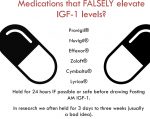Hi there!
This might be a long shot, but I was going through some old lab results of mine and happened to see that my GH and IGF-1 had been tested at one point. My IGF-1 seemed to be within the reference range (in the middle somewhat on the lower spectrum).
Though I looked at my GH result and saw it was 0.07 µg/L. I know a single GH test can't be used to diagnose a Growth Hormone deficiency (but neither can a normal IGF-1 exclude it as far as I've understood), but that number seemed a little low to me. There were no reference range since GH secretion is pulsatile.
I read that single values above 3 µg/L could rule out GHD, but do you guys think this could be something to look into or am I grasping at straws? Perhaps GH values close to zero are expected or even desirable. Or perhaps it means nothing due to the pulsatile nature of GH. I know very little about it. I just thought I'd check in.
I'm going to an endocrinologist soon for an unrelated matter and thought I might as well ask about it, but I'm not sure I want to bring it up if it's a completely normal value! What would you say?
This might be a long shot, but I was going through some old lab results of mine and happened to see that my GH and IGF-1 had been tested at one point. My IGF-1 seemed to be within the reference range (in the middle somewhat on the lower spectrum).
Though I looked at my GH result and saw it was 0.07 µg/L. I know a single GH test can't be used to diagnose a Growth Hormone deficiency (but neither can a normal IGF-1 exclude it as far as I've understood), but that number seemed a little low to me. There were no reference range since GH secretion is pulsatile.
I read that single values above 3 µg/L could rule out GHD, but do you guys think this could be something to look into or am I grasping at straws? Perhaps GH values close to zero are expected or even desirable. Or perhaps it means nothing due to the pulsatile nature of GH. I know very little about it. I just thought I'd check in.
I'm going to an endocrinologist soon for an unrelated matter and thought I might as well ask about it, but I'm not sure I want to bring it up if it's a completely normal value! What would you say?
Last edited:




